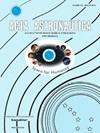用于清除空间碎片的激光光学技术
IF 3.1
2区 物理与天体物理
Q1 ENGINEERING, AEROSPACE
引用次数: 0
摘要
为了确保空间飞行的安全,正在提出从近地空间清除人工(人造)空间碎片的技术。所提方法的基本原理是利用强烈的太阳辐射来引导和集中空间碎片,目的是产生等离子体制动,将碎片从圆形轨道转移到椭圆形轨道,然后在大气稠密层中燃烧。与此同时,位于太阳同步空间轨道并永久面向太阳的合成多孔径光学系统为产生大量太阳辐射提供了便利。本文章由计算机程序翻译,如有差异,请以英文原文为准。
Laser-optical technologies for space debris removal
Technologies for the removal of space debris fragments of artificial (man-made) origin from near-Earth space is being proposed in order to provide the security of space flights. The fundamental principle of the proposed method is based on the utilization of intense solar radiation to direct and concentrate at space debris fragments with the aim of creating a plasma braking and transferring the fragment from a circular to an elliptical orbit following its subsequent burn up in the dense layers of the atmosphere. At the same time, the generation of substantial solar radiation is facilitated by a synthesized multi-aperture optical system situated in a heliosynchronous space orbit and permanently oriented towards the Sun.
求助全文
通过发布文献求助,成功后即可免费获取论文全文。
去求助
来源期刊

Acta Astronautica
工程技术-工程:宇航
CiteScore
7.20
自引率
22.90%
发文量
599
审稿时长
53 days
期刊介绍:
Acta Astronautica is sponsored by the International Academy of Astronautics. Content is based on original contributions in all fields of basic, engineering, life and social space sciences and of space technology related to:
The peaceful scientific exploration of space,
Its exploitation for human welfare and progress,
Conception, design, development and operation of space-borne and Earth-based systems,
In addition to regular issues, the journal publishes selected proceedings of the annual International Astronautical Congress (IAC), transactions of the IAA and special issues on topics of current interest, such as microgravity, space station technology, geostationary orbits, and space economics. Other subject areas include satellite technology, space transportation and communications, space energy, power and propulsion, astrodynamics, extraterrestrial intelligence and Earth observations.
 求助内容:
求助内容: 应助结果提醒方式:
应助结果提醒方式:


